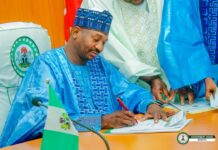An Economist, Prof. Segun Ajibola has advised the Federal Government to do everything possible to reduce the high cost of governance and block all drain pipes used in siphoning the country’s wealth.
Ajibola gave the advice in an interview with the News Agency of Nigeria (NAN) on Tuesday in Abuja, while reacting to the signing of the 2019 Appropriation Bill of N8.92 trillion into law.
President Muhammadu Buhari had on Monday signed the 2019 appropriation bill into law, signaling beginning of the implementation of the 2019 fiscal calendar.
The budget was increased by the legislature by N90 billion from the N8.83 trillion presented by Buhari on Dec. 18, 2018.
According to him, the recurrent expenditure of N4.65 trillion in the budget is still on the high side.
“The debt service of N2.25 trillion is high.
“However, the projects financed by the loans must directly generate enough revenues and surpluses and indirectly create sufficient multiplier effects to help galvanise the economy.
“This is the only way such huge debt service ratio can be rationalised.’’
Ajibola, a former President of the Chartered Institute of Bankers of Nigeria, however, said the capital expenditure of the budget would help to build infrastructure.
“The 2019 budget seeks to reposition the Nigerian economy by concentrating attention on the critical sectors and industries, and provision of basic infrastructure.
“With N2.94 trillion of the N8.92 trillion devoted to capital expenditure, it is expected that some key projects across industries and zones of the country would be completed during the year.
“This will help the economy to end on a stronger note in year 2019.
“One also expects the various projects tied and infrastructure related borrowings from China and others to strengthen the productive capacity of the country,’’ he said.
In addition, Ajibola said that January to December fiscal year was more acceptable and globally practiced by corporate institutions and economic players.
He said the proposed budget cycle of January to December was not a stand-alone strong factor in the quest for improved implementation records but that it would enhance smooth budget process.
“It goes with the global and national culture of most leading corporate institutions wherein their annual budget is January to December.
“Hence financial reports, tax records and other financial dealings are computed using January to December cycle. The government fiscal year would align with this practice.
“The National Assembly has the statutory power to propose changes to the budget.
“ However, I believe such changes should receive the blessing of the Executive arm of the government which is the arm that will be responsible for the budget implementation.
“Unilateral decision of the National Assembly to impose such amendments may not help a healthy working relationship between the two arms of government,’’ he said. (NAN)



